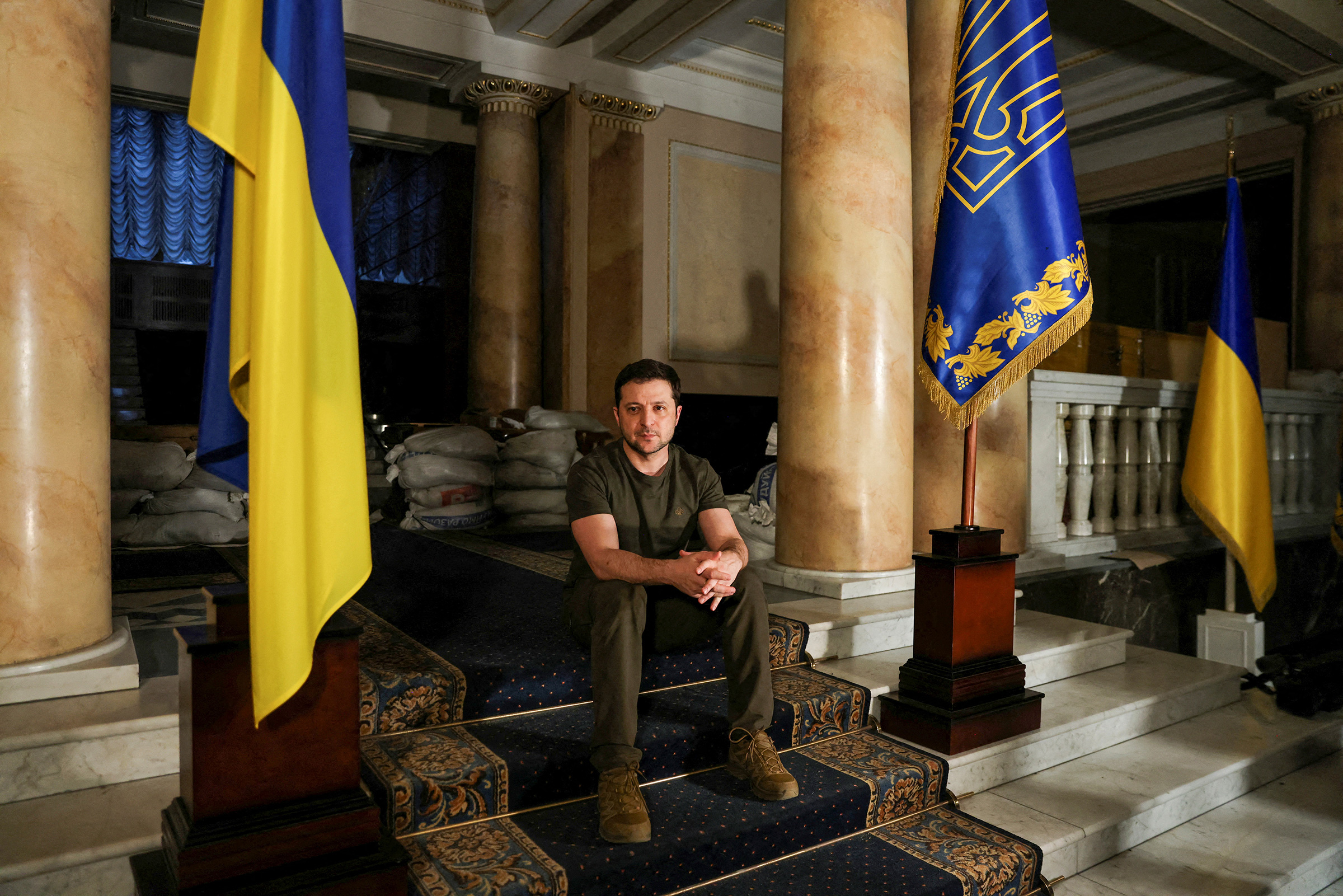The President wanted to get to the trenches. He’d already walked for half an hour in his helmet through the mud, surrounded by generals and guards, and he insisted they continue. On the far side of some sagging power lines, the group could see the start of the Russian positions, well within reach of the snipers who had killed three Ukrainian soldiers two weeks before. But Volodymyr Zelensky refused to stop.
“Our guys are over there, right?” the commander in chief asked one of his generals, who was advising the group to turn back. “They’ll hear I came all this way and didn’t come to see them. They’ll be upset.” Then Zelensky tossed a glance in my direction, spun around, and continued hiking through the brush.
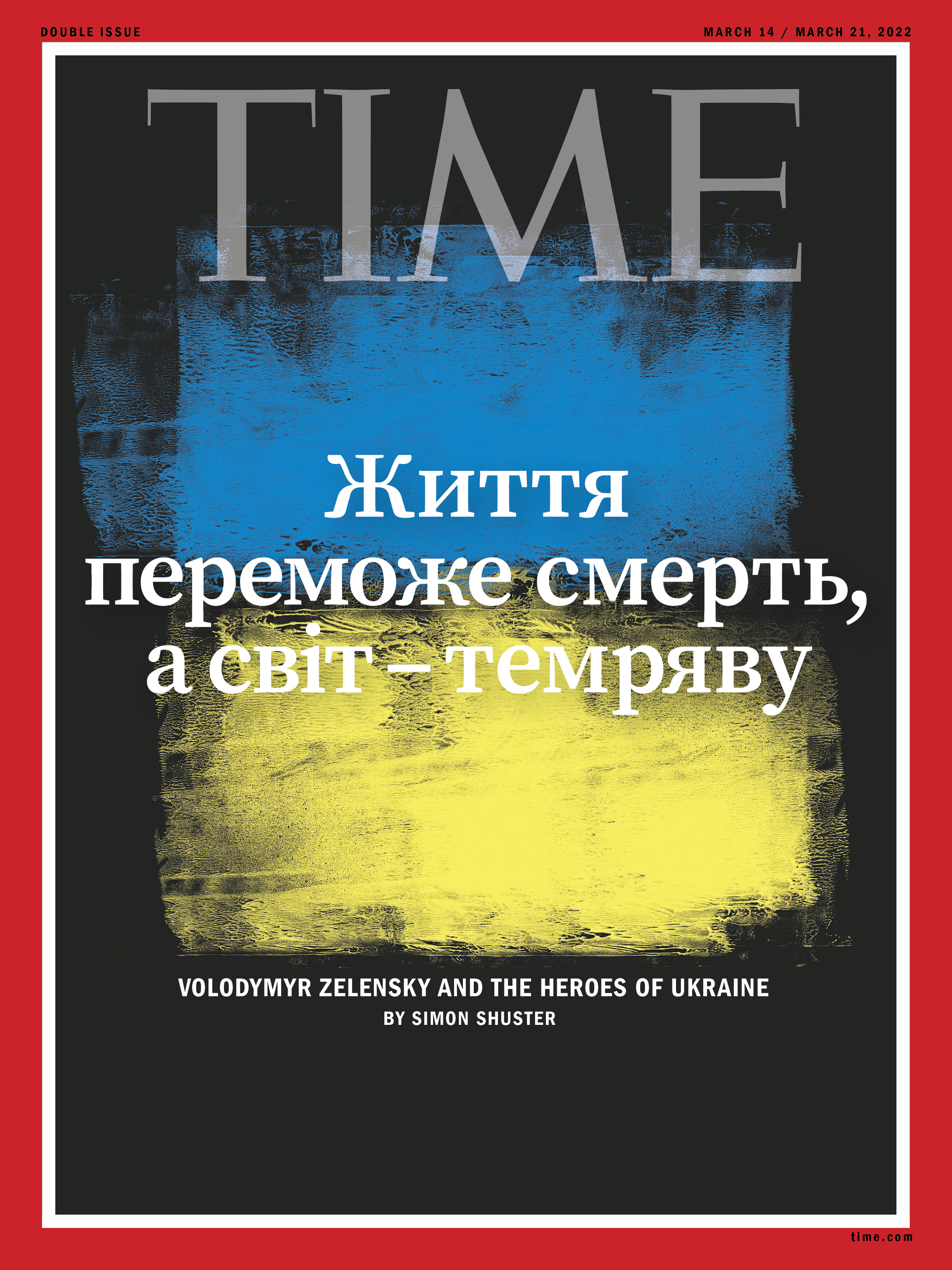
The gesture made me wonder: Was this an act? We’d met for interviews before, the first time backstage at Zelensky’s comedy show in the spring of 2019, during his moonshot campaign for Ukraine’s presidency. We met again that winter in Kyiv’s presidential headquarters, which he described at the time, only half joking, as a gilded fortress he wanted to escape. But this trip to the front lines last April was the first time I’d seen him with his troops—the former actor playing the part of the generalissimo. It was not entirely convincing.
The danger, though, was very real. By the time Zelensky came to power, Ukraine had been at war with Russia for more than five years. The death toll had topped 13,000, with almost nightly shooting or shelling across the front lines, a jagged tear between the once fraternal nations. No one knew at the time that the war would soon become incalculably worse. But during our trip to the front, Zelensky was aware the Russian troops were already massing by the tens of thousands on the other side of the border.
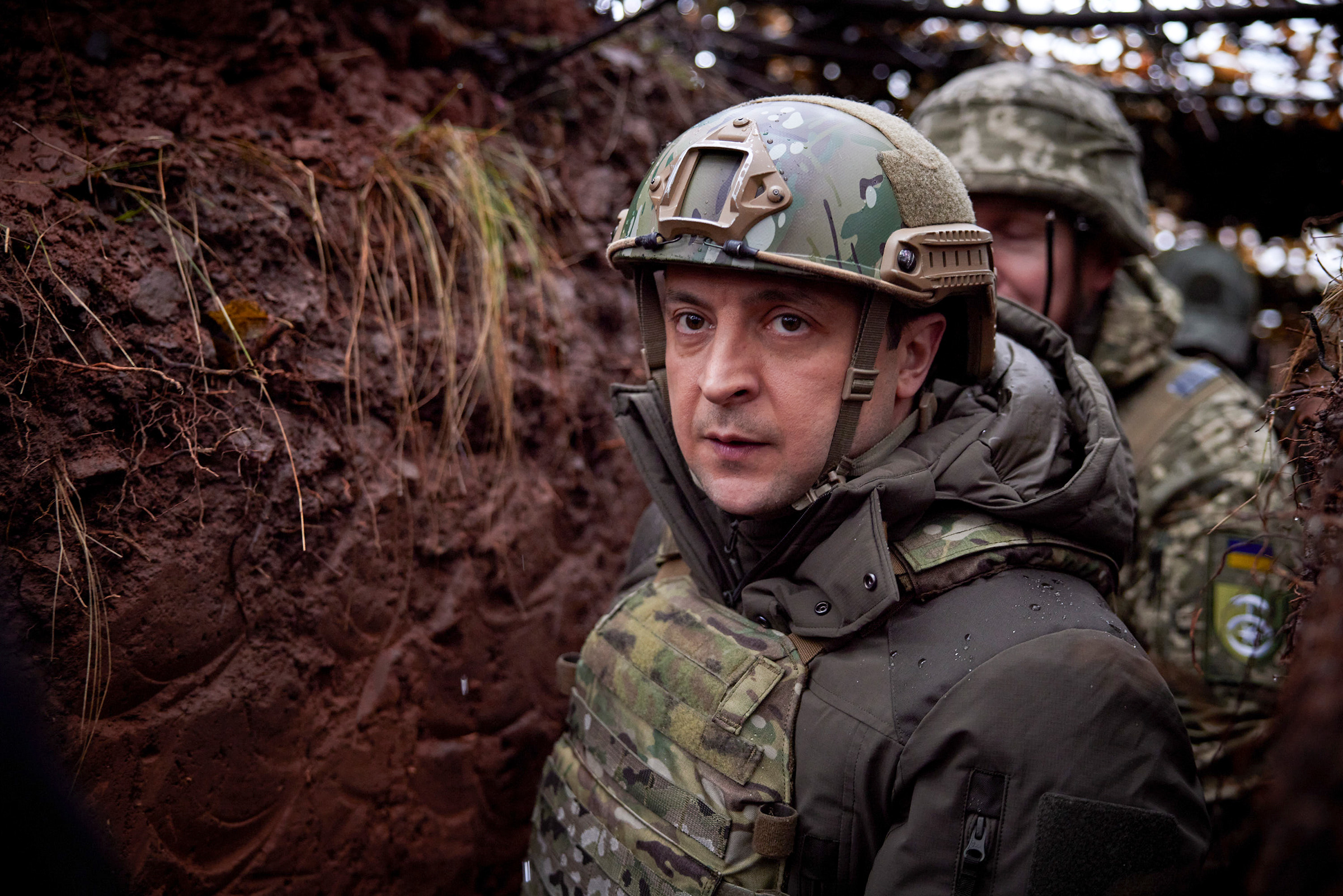
“They want us to be afraid,” he told me at the end of the trip, as we flew back to Kyiv on the presidential plane. “They want the West to be frightened of the strength and power of Russia. There’s no big secret here.” Zelensky understood that showing his fear would play into Russia’s hands, though he admitted that the threat of an invasion scared him. “What’s frightening is that their intentions may not end” with a show of force at the border, he told me. “There could be a broader military plan.”
From the Archives: TIME’s April 2021 Interview With Volodymyr Zelensky on Russia
About 10 months later, in the early morning hours of Feb. 24, Russia put that plan into effect. Vladimir Putin ordered his troops to “de-Nazify” Ukraine, his chosen term for ousting the first Jewish President in its history and installing a regime loyal to Russia in his place. The invasion thrust Zelensky into a different role, one that at first seemed ill-suited to his character. His friends and advisers have often told me that Zelensky has thin skin. He suffers from the actor’s malady: an abiding need to be liked and applauded. “We try not to let him look at Facebook,” one adviser told me, because critical comments from strangers were liable to depress him.
But as the Russian bombs began to fall on Ukrainian cities and troops moved to surround the capital, the President underwent a transformation. Before our eyes he came to embody a struggle that most Western statesmen had long forgotten how to fight, the one that is sometimes required to keep tyranny from killing off democracy. Zelensky not only rallied his own people to defend their nation, inspiring them to toss petrol bombs at Russian military vehicles and stand in the way of tanks. He also galvanized the world’s democracies in ways that seemed unthinkable just a week before.
The change was not instantaneous. Western leaders were still divided two days after the invasion, when they met to agree on a package of sanctions to punish Russia for its attack. Germany, Hungary, and Italy initially wanted to water down these measures. Then Zelensky dialed in to their meeting. Calm but determined, his pale face covered in stubble, he told the leaders of the free world that this might be the last time they would see him alive. “The enemy has marked me as target No. 1,” he said in a video statement shortly after the call. “My family is target No. 2.”
Yet Zelensky decided to stay in his capital, an act of courage that has already altered the course of history. It roused the U.S. and its allies to impose unprecedented penalties against Russia, crashing the ruble and unplugging much of its economy from the rest of the world. Germany decided to pour more than $100 billion into its military, casting aside a postwar tradition of pacifism that has long frustrated allies. Switzerland broke from its tradition of neutrality to support sanctions. The E.U. agreed to put Ukraine on a path to membership, shedding decades of internal resistance.
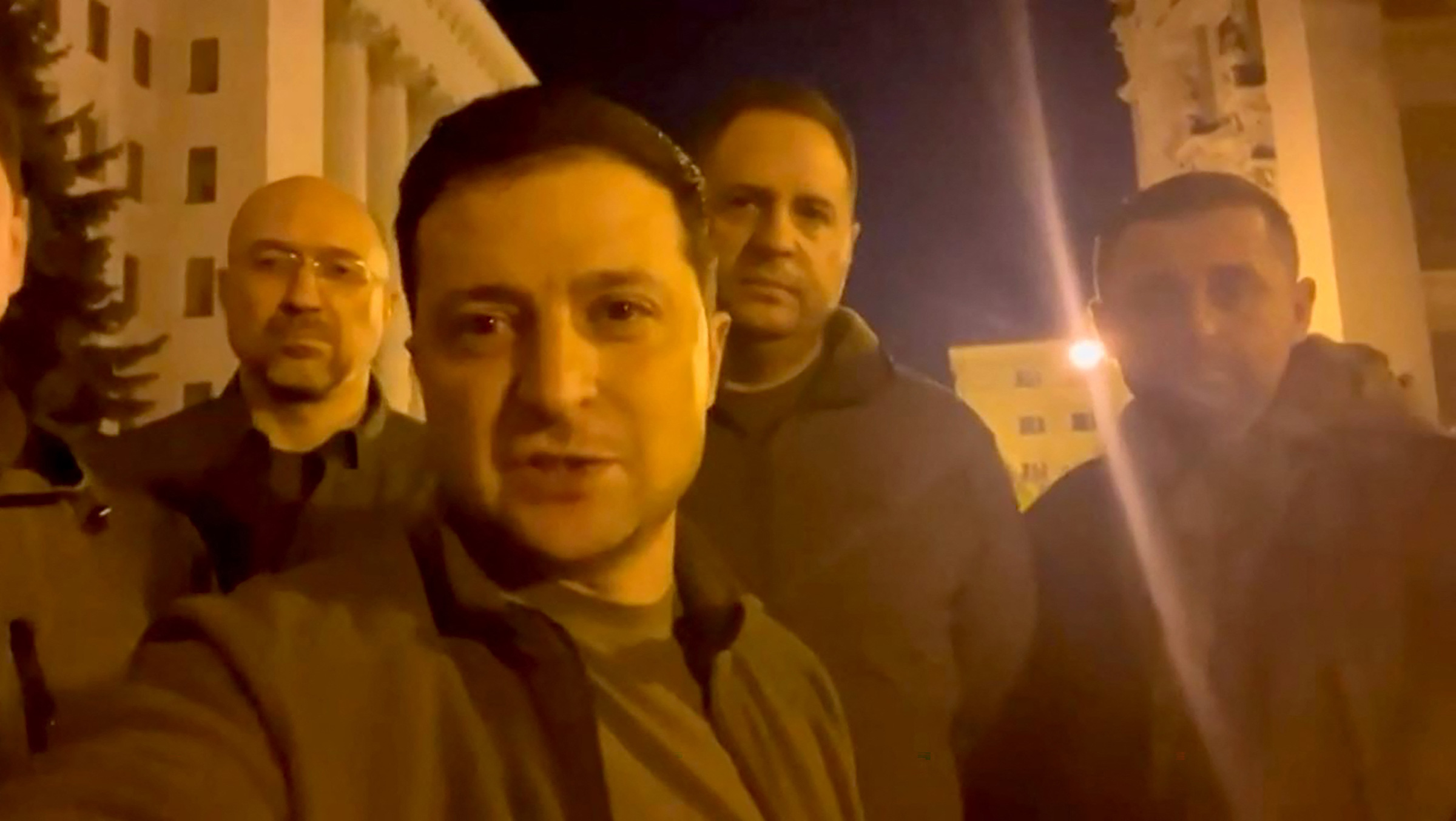
On the sixth day of the invasion, Zelensky delivered a speech via video link to the European Parliament. “Do prove that you are with us,” he implored through an interpreter, who seemed to choke back tears while translating the President’s words. “Do prove that you will not let us go. Do prove that you indeed are Europeans, and then life will win over death, and light will win over darkness.” As one observer noted, it was as if Charlie Chaplin had morphed into Winston Churchill.
Zelensky now spends his days underground, in bunkers and basements, emerging every now and then to raise the nation’s spirits, often on social media. In one video message, he shares a meal with a few of his troops: bread with salami, sprats, and instant coffee. The people who surround him are mostly old friends, the ones who followed him through the world of show business, into the presidency, and now to war. “No one is here by accident,” his chief of staff, Andriy Yermak, wrote to me from the bunker on the seventh day of the invasion.
Born in 1978, the future President grew up in a working-class Jewish family in the city of Kryvyi Rih (“Crooked Horn”), in the shadow of Ukraine’s biggest steel mill. Like many in that part of the country, his parents spoke Russian at home. Like nearly all Jews in Ukraine, the family had suffered tremendously during World WarII. Zelensky’s grandfather, who commanded an artillery platoon in the Red Army, lost his father and three of his brothers in the Holocaust.
After the Soviet Union fell apart in 1991, Zelensky’s hometown became what he called a “city of bandits,” its economy in steep decline. To stay off the streets, he joined a sketch-comedy troupe at 17, performing with his friends around Ukraine and later in Russia. The troupe went on to form a production company called Kvartal 95 (District 95), after the neighborhood where they grew up. “It was a rough place, the kind that makes you desperate to escape,” says Vadim Pereverzev, Zelensky’s old friend and business partner. “That was our main motivation.”
The offices of Kvartal 95 now occupy the top three floors of a high-rise near the center of Kyiv, with panoramic views over the city. Its walls are covered in posters for the movies they produced, mostly romantic comedies with the future President in the starring roles. Zelensky also lent his raspy voice to the animated bear in the Ukrainian version of Paddington. He worked on the Ukrainian version of Dancing With the Stars, both as a contestant (he won) and a producer.
His biggest hit was a sitcom called Servant of the People, which first aired in 2015. The show was based on a wacky premise: a high school history teacher, played by Zelensky, uncorks an epic rant against corruption, which one of his students films and posts on YouTube. The clip goes viral on the eve of an election, prompting voters to install the teacher as the nation’s President in a rebuke to the amoral elites.
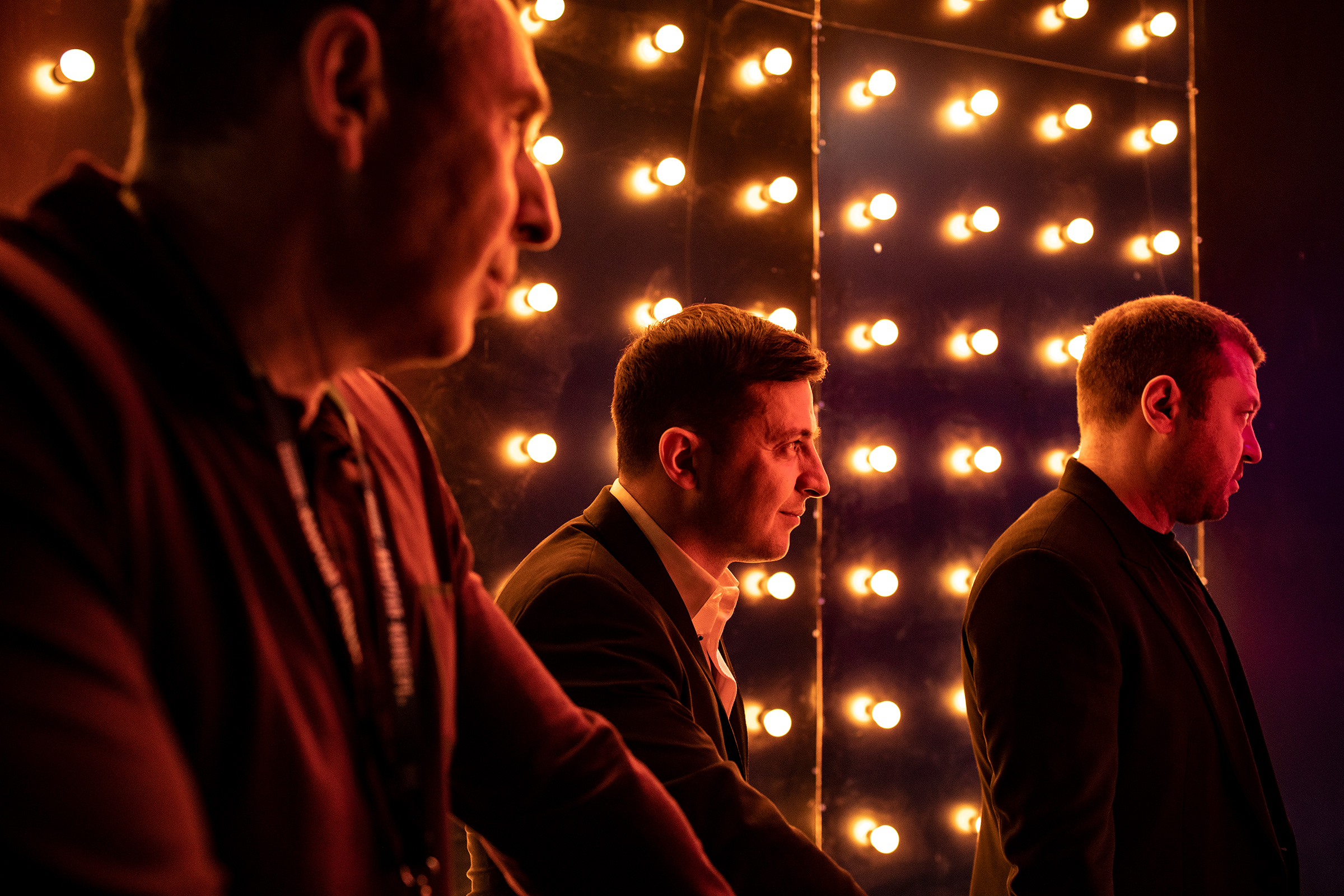
The show was a sensation in both Russia and Ukraine, and in 2019 it became Zelensky’s springboard into politics. In a video posted on YouTube that New Year’s Eve, he stood next to a Christmas tree and announced his intention to run for Ukraine’s highest office. Voters flocked to his campaign, which was hardly traditional: Zelensky did not take part in debates or publish an electoral platform. Instead he continued touring with his comedy show, a mix of vaudeville and political satire that was not always in the best of taste. (One sketch had Zelensky pretend to play a Jewish folk song on the piano with his penis.) When the act premiered in Kyiv during the presidential race, the city’s biggest concert hall was filled to capacity, despite ticket prices that ran about as high as the average Ukrainian monthly pension. Members of the troupe partied backstage, wondering what Cabinet positions they might get if Zelensky won. “I think I’d make a pretty good Defense Minister,” said one comedian, Alexander Pikalov, after pouring me a shot of whiskey in a plastic cup.
In his dressing room after the show, Zelensky had little interest in discussing politics or foreign affairs. The closest he came was this promise: “We’ll figure it out.” His production company had just wrapped the third season of Servant of the People, in which Zelensky’s character saves Ukraine from ruin. It appeared on Netflix a few days before the election, giving voters enough time to binge the season before heading to the polls. “There’s no way the others can compete with that,” Zelensky told me with a smile in his dressing room.
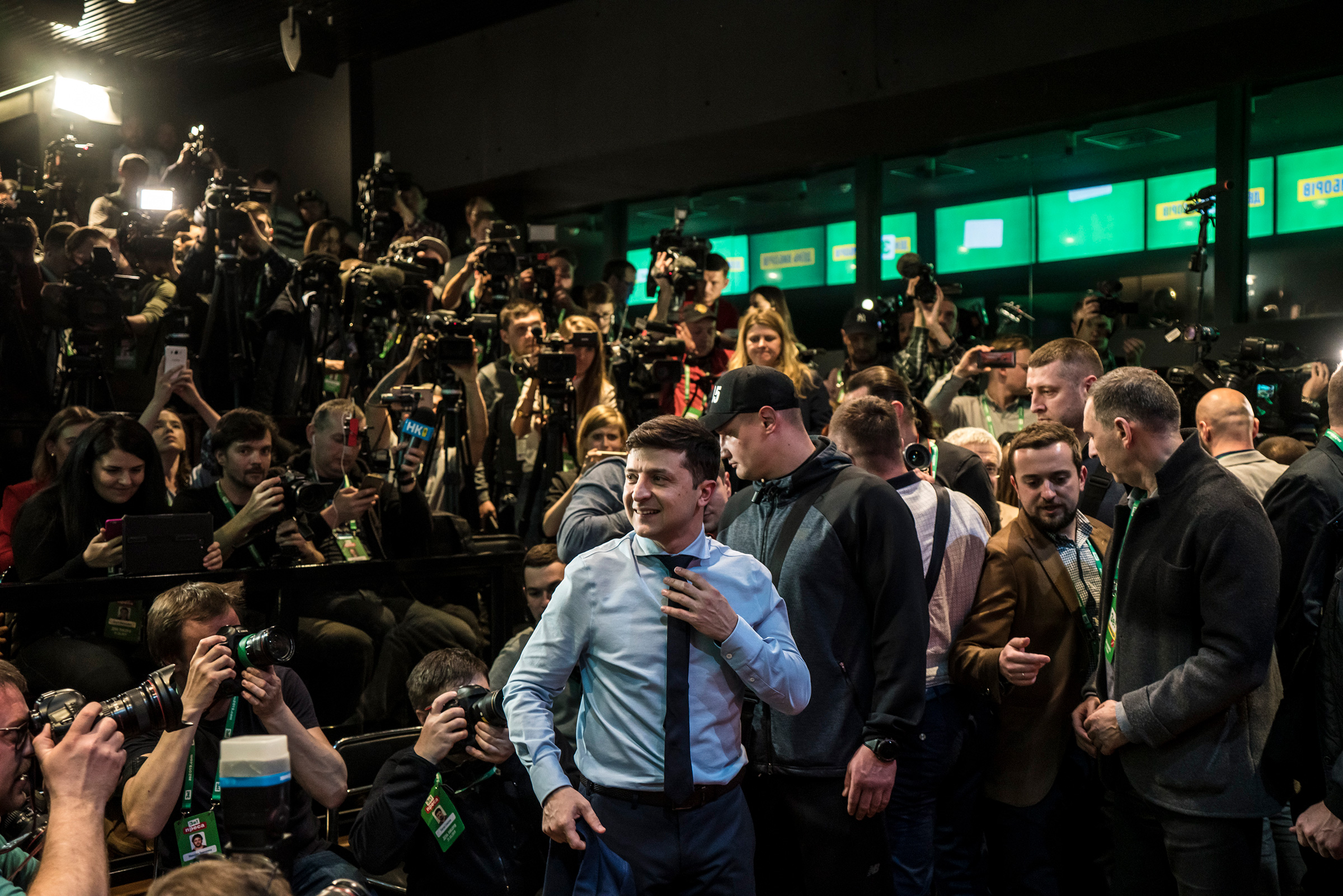
He was right. Nearly three-quarters of the electorate cast their ballots for him in the final round of voting. His campaign swept virtually every region of the country, including those that tend to lean toward Russia. That May, Zelensky’s new political party, which he had named after his sitcom, took a majority in parliament, becoming the first in Ukraine’s history to control both the legislature and the executive branch.
Zelensky’s first priority as President was to bring peace with Russia. But he faced an obstacle in Ukraine’s most important ally. Two months into his tenure, the U.S. froze aid to Ukraine worth nearly $400 million, most of it meant to shore up the nation’s military. U.S. President Donald Trump wanted the Ukrainians to legitimize his claims of corruption against Joe Biden, and he was using the military aid as leverage. In a phone call in July 2019, Trump asked Zelensky to “do us a favor” by announcing investigations into those bogus claims.
The blackmail attempt, which led to Trump’s first impeachment in the House of Representatives, dented Zelensky’s faith in Ukraine’s foreign partners. “I don’t trust anyone at all,” he said when we met in his office that December. A few days later, he was due to meet Putin for their first round of peace negotiations. His expectations were low, but he was intent on doing whatever it took to avoid a broader war. The eastern regions Russia occupied in 2014, he said, were not worth the lives of Ukrainian soldiers. “I cannot send them there,” he told me. “How? How many of them will die? Hundreds of thousands, and then an all-out war will start, an all-out war in Ukraine, and then across Europe.”
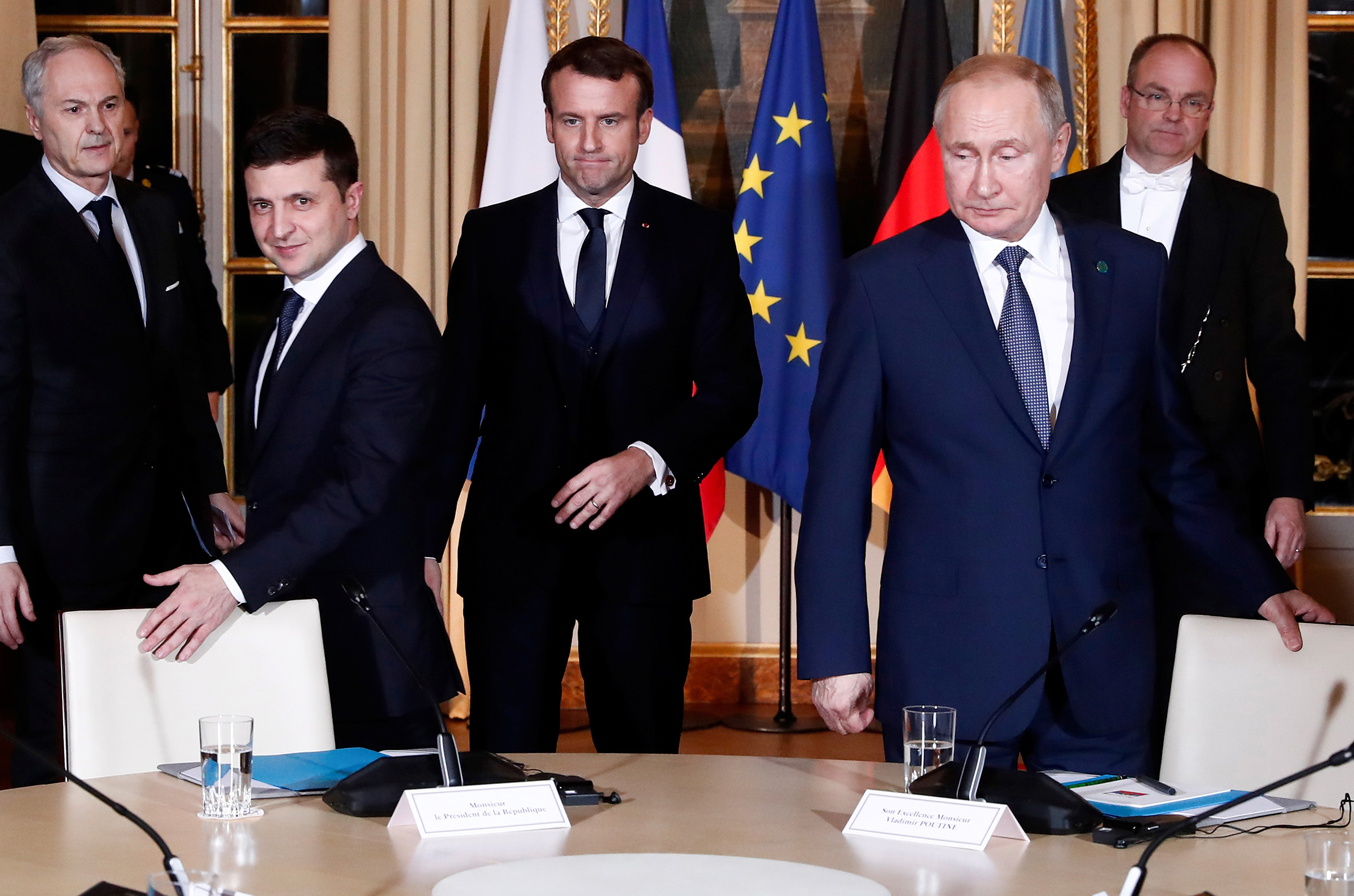
The talks with Putin went nowhere. Russia refused to cede control of the breakaway regions in east Ukraine, and the government in Kyiv refused to grant those regions the autonomy Moscow demanded. Soon the COVID-19 pandemic was raging, and Zelensky could not secure vaccine supplies from his allies in the West. Nor would he accept an offer from Putin to provide Ukraine with Russian-made vaccines, which Kyiv saw as a weapon in Moscow’s information war. Many voters felt differently. By the end of 2020, public support for Zelensky dropped as low as 20% in some surveys, down from over 70% a year earlier.
Read More: Putin Wants Revenge Not Just on Ukraine But on the U.S. and Its Allies
The Ukrainian government then turned its focus to political skirmishes, going after pro-Russian politicians and other domestic opponents. The first big target of the crackdown was Putin’s close friend Viktor Medvedchuk, who chairs the biggest opposition party in the Ukrainian parliament. The state seized the assets of Medvedchuk’s family and later placed him under house arrest. Even some of Zelensky’s closest allies were dismayed at the decision. “It certainly raises questions about the rule of law,” Dmytro Razumkov, who had led Zelensky’s presidential campaign, told me in October, hours before he was ousted as speaker of the parliament.
Putin was furious over the crackdown against his friend Medvedchuk, calling it an “obvious purge of the political field.” He responded by sending thousands of Russian troops to the border for a series of “large-scale exercises” that went on for most of 2021. Shelling and sniper fire increased along the front lines. The U.S. began to warn of a rapid escalation, even an invasion.
Through it all, Zelensky tried to project a sense of calm. On our visit to the front lines in early April, he spent nearly an hour talking to the troops inside a system of trenches they had nicknamed Vietnam—a nod to the mud and morass of a war they had seen in the movies. General Ruslan Khomchak, then the top commander of Ukraine’s armed forces, took the President to the spot where three of his soldiers had been killed in an ambush two weeks earlier. “There was no tactical reason to attack that post,” Khomchak said. “They just shot those boys in cold blood.”
To my surprise, Zelensky did not promise to avenge them. Instead he questioned the wisdom of sacrificing soldiers in defense of these muddy dugouts. Ukraine had seized that bit of ground in a violent push in 2018, the year before Zelensky was elected. “For some, that meant we were the tough guys,” he told me before we headed back toward the armored cars. “For others it meant their sons would not be coming home.” The President had no intention of making such trades again. The lives of his soldiers, he said, were more valuable to him than any scraps of contested terrain.
His foil in the Kremlin clearly disagreed. By early winter, the number of Russian troops on Ukraine’s borders topped 70,000. Around Halloween, the warnings from the U.S. government began to grow more dire. At meetings in Kyiv and Washington, U.S. intelligence officials and diplomats tried to convince Zelensky’s team that a Russian invasion was imminent. “They put the chances at 80%,” says one foreign policy adviser to Zelensky, who received these briefings last fall. The Americans backed up their estimates, the adviser says, with satellite imagery of Russian hardware arrayed at the border, as well as intercepted communications that suggested Russia was preparing to invade.
But Zelensky and his inner circle did not believe an invasion was at hand. Ukrainian border guards told him the chances of a full-scale attack were not much higher than they had been since the war started in 2014. “We’re talking about a black-swan event,” says Iuliia Mendel, a communications adviser to Zelensky. “Nobody could believe it was going to happen.”
Read More: The Untold Story of the Ukraine Crisis
In the early morning of Feb. 24, both Putin and Zelensky appeared on TV in their respective countries to deliver their final speeches before the invasion commenced. The contrast between them could not have been starker. Putin’s address dripped with menace, and his claims against Ukraine were detached from reality. He said he had ordered a “special military operation” aimed at the “demilitarization and de-Nazification” of the entire country. It was a pledge, in effect, to oust the government of a sovereign nation and destroy the armed forces of Russia’s largest neighbor to the west. Putin also issued a chilling threat to any “outside forces” that might come to Ukraine’s defense: “It will lead to consequences of the sort that you have not faced ever in your history.”
In his own address, Zelensky chose to speak directly to the Russian people. He told them he had tried to reach Putin that day in a final effort to avert the invasion, but the Kremlin had ignored him. Then he tried to counteract the propaganda coming from Russian state TV. “You are told that these flames will bring freedom to Ukraine. But the people of Ukraine are already free,” he said. “In attacking us, you will see our faces, not our backs.”
The Russian assault began that morning with a barrage of rockets lobbed at cities across Ukraine. Troops poured over the border from multiple directions, making a push toward Kyiv from the north in an attempt to overrun the capital. Zelensky holed up in the presidential headquarters with his team of close advisers. His chief of staff, Yermak, remembers that as a moment of clarity. “When you realize that, despite all your efforts, the scariest thing of all has happened, then everything becomes extremely sharp and clear,” he wrote to me. “We are here, they are there. They attacked us. We are defending. Truth is on our side.”
It gave Ukraine a clear advantage in the information war, where Zelensky’s stagecraft turned into a powerful weapon. As Russia spread lies about neo-Nazis using children in Ukraine as human shields, Zelensky countered with a barrage of posts on social media, letting his people hear the earnest, grainy voice they had come to know from his movies. He seemed to be near them, and he was: Zelensky had refused an offer from the U.S. to evacuate him to safer ground. “I need ammunition,” he told the Americans. “Not a ride.”
The President did not even retreat from the government quarter in Kyiv’s center. Nor did he wear a bulletproof vest. Photos and videos showed him in a T-shirt as he led his besieged nation from some of the same familiar rooms, with their indigo carpets and heavy chandeliers, where I had met him and his staff at the start of his tenure. Only now the floors were heaped with sandbags and soldiers stood around, forming a weak defense against the Russian bombs that fell nearby.
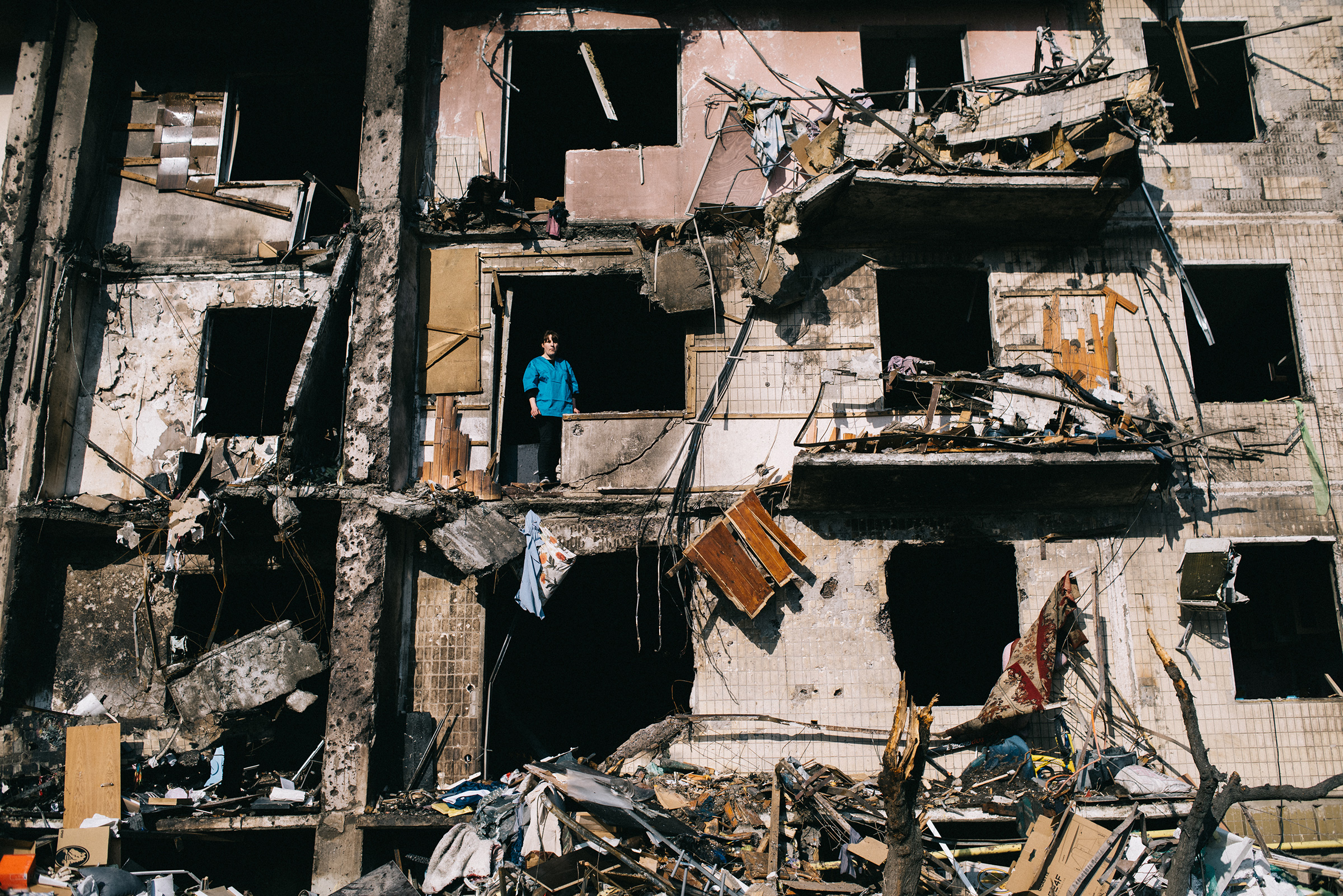
Images of devastation reached Zelensky’s team from across the country: dozens of fatalities, including children, as artillery pounded residential neighborhoods; a missile striking the TV tower in Kyiv; another one landing on the central square of Kharkiv in the east. Yet for every report of a Russian barrage, there was news of Ukrainians standing their ground, destroying columns of armored Russian vehicles, capturing tanks and prisoners of war. It soon became clear to military experts that Putin had misjudged both the will and the ability of Ukrainians to resist. U.S. intelligence assesses that morale is sagging among the Russian soldiers on the ground, according to a senior U.S. defense official.
On the fourth day of the invasion, Zelensky sent a few of his comrades to an initial round of peace talks with Putin’s men. They agreed only to continue talking, even though the Kremlin showed no sign of dropping its demands. As aid poured into Ukraine from the West—including shoulder-fired rockets that could take out Russian tanks and aircraft—Putin ordered his generals to put Russia’s nuclear forces on high alert.
On the last day of February, Zelensky appeared before a camera in the government compound to sign a formal application to join the E.U. “Our goal is to be together with all Europeans and, most importantly, to be on an equal footing,” he said. “I’m sure it’s fair. I’m sure it’s possible.” All of a sudden, after nearly two decades of frustrating talks with E.U. leaders, Ukraine appeared to be within reach of joining the bloc. The president of the European Commission, Ursula von der Leyen, told reporters the same day that Ukraine is “one of us and we want them in the European Union.”
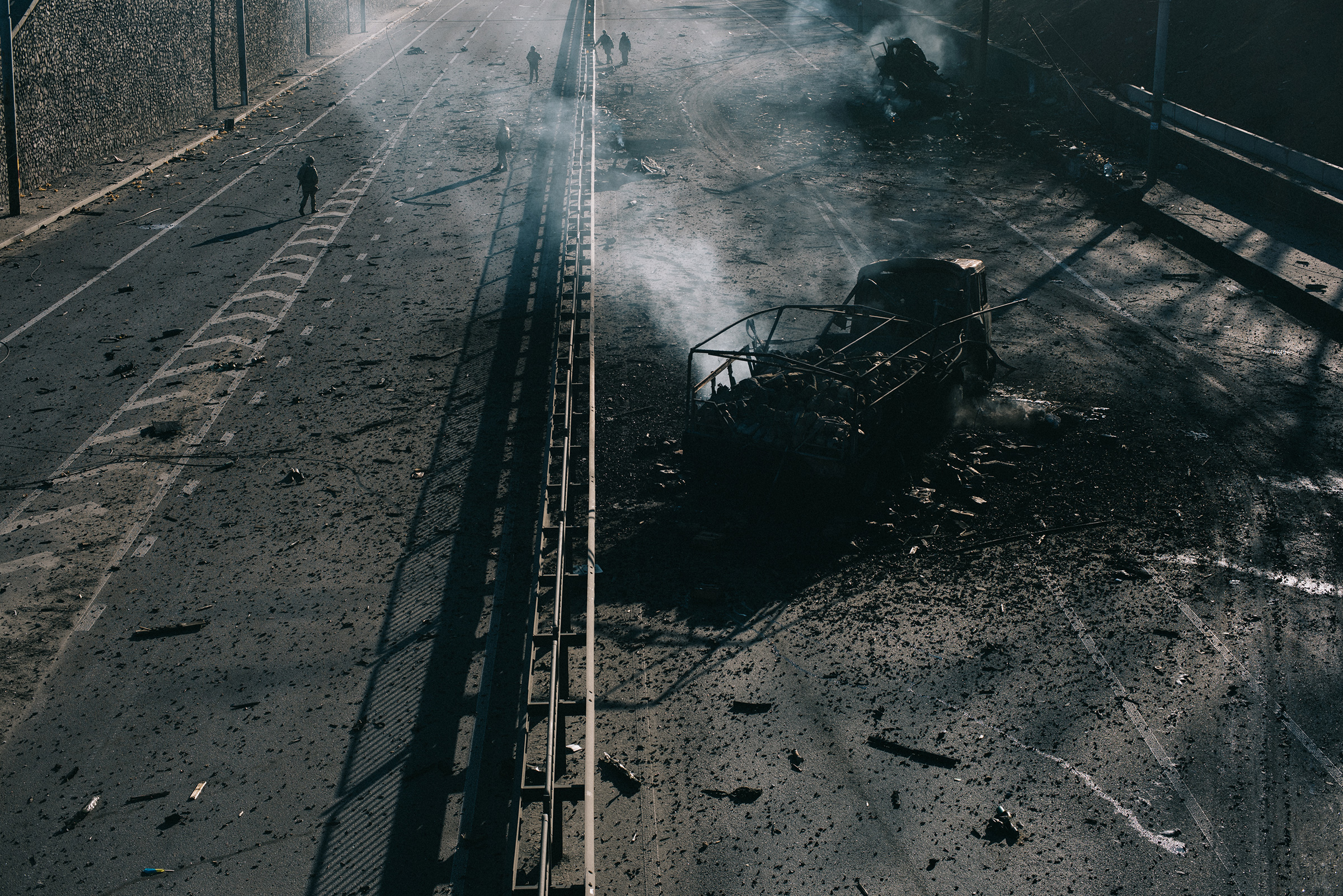
Toward the end of the first week of all-out war, a 40-mile column of Russian military hardware began to form a noose around Kyiv. Yet Zelensky’s advisers assured me that spirits remained high. “We all get what’s at stake,” Yermak, his chief of staff, wrote me. “Our freedom. The very existence of our state. So we’re working flat out, beyond the limits of our strength.” Apart from commanding his military forces, the President’s days were packed with phone calls of support from around the world: the Prime Ministers of Japan, Norway, Israel, and India; the Presidents of Poland, France, and the U.S.; the King and Queen of the Netherlands; the Orthodox Patriarch in Istanbul; even the Pope.
With every new promise of aid and prayer for safekeeping, Ukraine and its leader seemed to transcend their roles as victims of aggression. They became examples of the kind of fortitude that all of us hope we can muster when called. There is no faking that kind of courage, and no way to tell whether we have it until the time we need it most. For Zelensky, that moment may have come on Feb. 25, the second night of the invasion. He walked outside his office into the winter air, surrounded by his closest aides, and filmed a simple message on his phone: “We are all here.”
—With reporting by Alejandro de la Garza, W.J. Hennigan, Nik Popli, and Simmone Shah
More Must-Reads from TIME
- Donald Trump Is TIME's 2024 Person of the Year
- Why We Chose Trump as Person of the Year
- Is Intermittent Fasting Good or Bad for You?
- The 100 Must-Read Books of 2024
- The 20 Best Christmas TV Episodes
- Column: If Optimism Feels Ridiculous Now, Try Hope
- The Future of Climate Action Is Trade Policy
- Merle Bombardieri Is Helping People Make the Baby Decision
Contact us at letters@time.com
